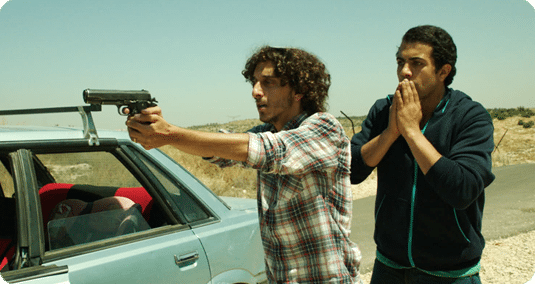Israel’s conflict with the Palestinians cuts across religious, national, territorial, linguistic and political lines. So it has been for more than a century now, and so it will probably be in the future.
Nadav Shlomo Giladi’s 26-minute film, Across the Line, which underscores this sober reality, is one of 11 Israeli movies scheduled to be screened online by ChaiFlicks during its Israel Independence Day Film Festival from May 4-9.
An Israeli Jew and a Palestinian Arab basically drive its narrative.
Hananel (David Shaul), the Israeli, is returning to his settlement in the West Bank in a battered old car. He informs his wife he’ll be back in time for the Sabbath. When his car breaks down, a Palestinian hitchhiker named Munthir (Jalal Masrwa) jumps into his back seat, surprising and annoying Hananel, a religious Jew who wears a white yarmulke.
Hananel and Munthir can hardly communicate. They know a few words from each other’s language, but that’s about it. So there is a lot of gesticulating as they try to make themselves understood.
Hananel doesn’t want to give Munthir a ride, but the Palestinian is insistent. He needs to see his pregnant girlfriend in a nearby Palestinian refugee camp, which is near Hananel’s settlement. Hananel reluctantly agrees to take him there.
They stop at an Israeli army checkpoint, only to be told the road is temporarily blocked. Against his better judgment, Hananel drives to an adjacent road reserved for Palestinians and forbidden to Israelis. In short order, a vehicle cuts them off. The Palestinian driver, a middle-aged man, hurls curses at Munthir and goes after him with a sledgehammer, forcing Hananel to whip out his pistol in a threatening manner.

Frightened by the violent encounter, Hananel drives away in haste, leaving Munthir alone on the road. Hananel, having forgotten his pistol, returns immediately to fetch it from Munthir, causing a scuffle to break out.
Returning to the road again, the pair are stopped by two Palestinian Authority policemen. Chaos ensues, and once again, Hananel drives away without Munthir. They meet again when the two police officers show up to reprimand or detain Hananel. To Hananel’s surprise, Munthir intervenes on his behalf, prompting a tangible gesture of generosity from Hananel.
The Israeli and the Palestinian go their separate ways, but their mutual experiences, however brief and fleeting, show that Jews and Arabs can coexist and act together in a spirit of cooperation and maybe even friendship. This is the hopeful message that Across the Line delivers in droll fashion.
For further information about the festival, click on www.JewishFilmFests.com.
